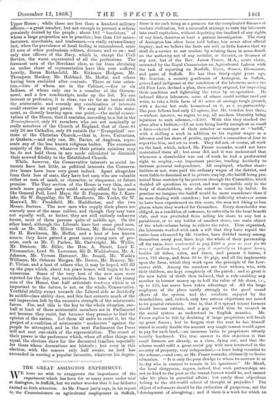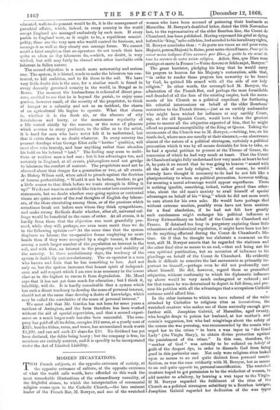THE GREAT ASSDIGTON EXPERIMENT.
WE have no wish to exaggerate the importance of the experiment which has been for so many years under trial at Assington, in Suffolk, but we rather wonder that it has hitherto excited so little attention. As Mr. Fraser justly says, in his report to the Commissioners on agricultural employment in Suffolk, there is no such thing as a panacea for the complicated diseases of modern civilization, but a successful attempt to turn day labourers into small capitalists, without depriving the landlord of any rights of any kind, deserves at least a patient investigation. The story of Assington has often been told before, but never after official inquiry, and we believe the facts are still so little known that we shall do a service to our readers by relating them in some detail, on the authority not of any socialist, or theorist, or dreamer of any sort, but of the Rev. James Fraser, M.A., acute cleric, entrusted by the Royal Commission on Agricultural Labour with the task of reporting on Norfolk, Essex, Sussex, Gloucester, and parts of Suffolk. No less than thirty-eight years ago, Mr. Gurdon, a country gentleman of Assington, in Suffolk, grieved and indignant at the condition of the labourers under the old Poor Law, devised a plan, then entirely original, for improving their condition and lightening the rates by oc-operatiou. Ile induced fifteen labourers, some of whom could neither read nor write, to take a little farm of GO acres of average rough ground, with a decent but rude homestead on it, as a co-partnership. The poor fellows had only £3 apiece, but Mr. Gurdon lent them, —without interest, we regret to say, all needless liberality being injurious to such schemes,—£400. With this they stocked the place after a fashion,-19 an acre being hardly enough on so small a farm—elected one of their number as manager or " bailiff," with a shilling a week in addition to his regular wages as a labourer and his share of profits, appointed a committee of four to supervise him, and set to work. They did not, of course, all work on the land, which, indeed, Mr. Fraser remarks, would not have maintained them all ; but some did, and it was understood that whenever a shareholder was out of work he had a preferential right to employ,—an important proviso, tending decidedly to increase personal independence. All employed, whether share- holders or not, were paid the ordinary wages of the district, and were liable to dismissal as if in private employ, the bailiff being pro- tected from coercion by his partners through the Committee, which decided all questions in secret, and was responsible only to the body of shareholders, who also voted in secret by ballot. In practice we imagine the bailiff would be more considerate than if he were dealing with outsiders ; but no difficulty whatever seems to have been experienced on this score, the men not liking to lose places where they worked for themselves. Every shareholder was obliged, as a condition of entrance, to subscribe to the local benefit club, and was precluded from selling his share to any but a parishioner, or to any holder of another share, one main object of the whole scheme being to relieve the rates. Thus organized, the labourers worked with such a will that they have repaid the entire loan advanced by Mr. Gurdon, have divided money among themselves every year, have kept the whole of their partnership off the rates, have contracted to pay £200 a year as rent for 60 acres of medium land, and do pay it regularly on 14-year leases, besides all tithes, rates, and taxes, and possess 6 horses, 4 cows, 110 sheep, and from 30 to 40 pigs, and all the implements upon the farm, which they work upon the principle of the four- course shift. Among the members are four widows, who, with their children, are kept completely off the parish ; and so great is the new habit of thrift thus induced, that a rule enabling any member to borrow money up to half the value of his share, i.e., up to £25, has never been taken advantage of. All the large employers of the place testify strongly to the good moral effects of the system and the comforts enjoyed by the shareholders, and, indeed, only two serious objections are raised to its general extension. One is, that if it spread tenant farmers would become extinct, and a gap would thus be created in the social system as understood in English counties. Mr. Fraser replies to this by doubting if large proprietors will break up great farms ; but he forgets that the rent he has himself stated is nearly double the amount any single tenant would agree to pay for such land,—an immense bribe to proprietors already heavily burdened. The true answer to this objection is that small farmers are already, as a class, dying out, and that the scheme would refill a great social gap with men interested in the security of property, very independent,—a lease being essential to the scheme,—and sure, as Mr. Fraser remarks, ultimately to desire education. " It is only the poor drudge to whom to-morrow is as to-day who is content to remain in his ignorance." Mr Maud, the local clergyman, argues, indeed, that such partnerships are not so kind to the poor as the tenant farmer would be, and cannot take his place in parochial affairs ; but surely these objections belong to the old-world school of thought or prejudice? The object of reformers should be the extinction of pauperism, not the development of almsgiving ; and if there is a work for which an
educated, well-to-do peasant would be fit, it is the management of parochial affairs, which, indeed, in every country in the world except England are managed exclusively by such men. If every parish in England were, as it ought to be, a republican munici- pality, these are the very men who would control its business, and manage it as well as they clearly can manage farms. We cannot avoid a faint suspicion that co-operators do not touch their hats quite as often as day labourers do,—which, no doubt, is very wicked, but still may fairly be classed with other inevitable evils inherent in fallen nature.
The second objection is a much more noteworthy and serious one. The system, it is hinted, tends to make the labourers too con- tented, to kill ambition, and to fix them to the soil. We have very little doubt this is the case, for a similar result is found in every decently governed country in the world, in Bengal as in Berne. The moment the husbandman is relieved of direct pres- sure, enabled to see that he is beyond the parish, to enjoy some portion, however small, of the security of the proprietor, to think of hunger as a calamity and not as an incident, the charm of an agricultural life begins to operate. What that charm is, whether it is the fresh air, or the absence of city feverishness and hurry, or the monotonous regularity of a life varied chiefly by the seasons, or the sense of pleasure which accrues to every producer, to the tiller as to the artist, it is hard for men who have never felt it to understand, but that it exists there is no doubt whatever. In every country the peasant develops what George Eliot calls " bovine" qualities, will meet slow ruin bravely, and bear anything rather than abandon his hold on his beloved " land." The feeling may seem to ambi- tious or restless men a bad one ; but it has advantages too, and certainly in England, at all events, philosophers need not grudge to labourers the comfort of content. The proprietors need not be alarmed about that danger for a generation or two, at all events. As Bishop Wilson said, when asked to preach against the doctrine of human perfectibility, " Would it not be better, brother, to get a little nearer to that ditch before we waste strength in filling it up?" We do not want in an article like this to enter into controversial statements, but we doubt whether easy-going squires or contented vicars are quite aware of the real thoughts of English day labour- ers, of the ideas circulating among them, or of the passions which sometimes break out before men whom they think sympathisers, and make strong Radicals doubt whether, after all, universal suf- frage would be beneficial to the cause of order. At all events, it is hardly from them that the objection can most gracefully pro- ceed, while they will, perhaps, see even more merit than we do in the following opinion :—" At the same time that the system displaces no labour, the co-operative farms employing no more hands than if they were occupied by a single tenant, it diffuses among a much larger number of the population an interest in the soil, and with that, an interest in the prosperity and stability of the country. In these revolutionary days, the tendency of the system is decidedly anti-revolutionary. The co-operator is a man who knows and feels that he has something to lose. And not only so, but the system increases that honest spirit of independ- ence and self-respect which I am sure is as necessary in the lowest class as in the highest to rescue it from degradation. Mr. Maud says that it has not yet done much for education ; but I think it, infallibly, will do. It is hardly conceivable that a system which has such a direct tendency to develop the sense of personal interest, should not at the same time develop a desire of knowledge, which may be called the correlative of the sense of personal interest."
We must add that Mr. Gurdou has not been for some years a resident of Assington, and the farm therefore has been worked without the aid of special supervision, and that a second experi- ment on a much larger scale has also been successful. The com- pany has paid off all its debts, occupies 212 acres, at a yearly rent of £325, besides tithes, rates, and taxes, has accumulated stock worth £1,200, and can sell each £3 share for £30. No dividend has yet been declared, the debts being heavy ; but the company is free, its members are entirely content, and it is speedily to be incorporated under the Act of Limited Liability.



































 Previous page
Previous page